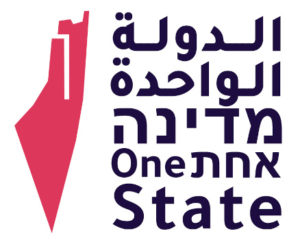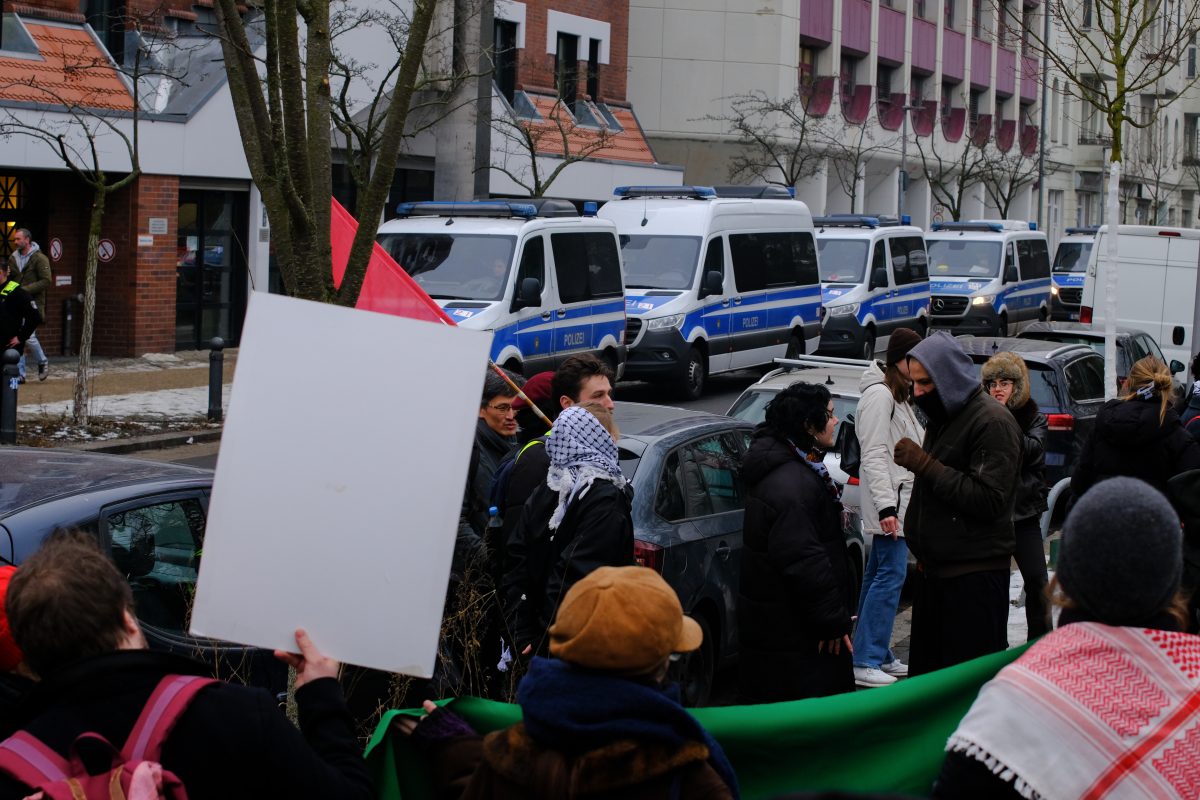Nothing is left of human dignity in Gaza, while the world simply looks on in horror. But at the same time global civil society resistance grows in spite of massive intimidation. Forward-looking Palestinians and Israelis campaign for a common perspective on one democratic state. Now more than ever.
By now even in Germany and in other countries with close ties to Israel, more and more people are dismayed by the horrendous images and news from Gaza. When they hear about the “two-state solution”, which has recently come back into vogue, this seems to them a way out.This to them means Israelis and Palestinians living “peacefully side by side“, protected from each other in their ethnically defined little states. Anna Baerbock recently tactfully reminded Israel to re-consider this „conflict resolution“.
“Conflict resolution” assumes that two populations – or two quarreling kids – with different interests are at loggerheads with each other. In the case at hand “the two sides“ are apparently unable or unwilling to come to an agreement. So better separate them and give them each their own territory . However, this “solution” with two states, one Israeli and one Palestinian, has been off the agenda for some years. It became impossible to overlook the fact that on the one hand there is a state with considerable power, on the other hand a powerless population. In the world we all live in a population without a state is virtually nothing, individually as well as collectively/politically.
The Palestinians are confronted with Israel, a state. Whereas they themselves are scattered across the West Bank, Gaza, Israel “proper“ (with 2nd class citizenship), and “ware-housed“ (Jeff Halper) in refugee camps in neighbouring states and elsewhere in the world. Israel is equipped with all the means of power that statehood implies. It rules over all the inhabitants and the entire territory, from the Jordan River to the Mediterranean Sea, in every respect (borders, economy, resources, jurisdiction, legislation, military …). Israel has never questioned this supremacy, neither in the times of the “Oslo Peace Process“ nor at any time before or after, neither under left-wing nor under right-wing governments. Indeed, Israel has consistently and systematically created conditions that do not allow for two separate, contiguous territories for two sovereign states.
In any case, Netanyahu recently candidly proclaimed that his government completely denies Palestinian claims to their own state. He shattered a fiction that the international community, peace loving people in Israel and all over the world and for a while even Palestinians believed all these years.
You can almost feel sorry for Anna Baerbock and colleagues.
How much longer can the structures and practices that keep Israel the uncontested owner and ruler of Palestine be overlooked? How much longer can “The Emperor’s New Clothes” politically convenient denial of reality continue? It was acceptable to the western supporters of Israel as long as the conflict stayed safely contained in the Palestinian ghetto. But now things get out of control, and “spill over“ into further catastrophes and wars…
Since the beginning of the Oslo “peace process”, with the “two-state solution”, some Palestinian and Israeli intellectuals/activists agreed on what the process was about: not peace but pacification by endless negotiations. That enabled Israel to realize its ambitions without restrictions. In this undertaking Germany was more helpful than any other ally.
At first glance it is suprising this was accomplished mainly via the generous financial support of the Palestinian Authority (PA). This Palestinian “government“ – of some patches of the Westbank (and formerly also Gaza) – uses German aid to pay for what the Authority needs to provide for the Palestinian population. German aid also pays for a considerable proportion of what Israel (as occupying power), is obliged to provide to the occupied Palestinian civilian population in the zones under direct occupation.
The civilian infrastructure regularly destroyed by Israel in the PA or occupied territories is rebuilt mainly with funding from the Federal Republic of Germany. What’s more, Germany has always been happy to ensure the security of the occupying power and the violent settlers. The Palestinian “security forces” are fully equipped and trained with German assistance. They are regularly deployed by the PA to brutally repress any protest against the occupying power or the PA. They are absolutely not meant to protect Palestinians against IDF and settler brutality.
In short, Germany helps financially and in word and deed to keep the gig running in the sense of Israel as long as “peace” and the “two-state solution” are the order of the day. Neither was ever intended to be fulfilled.
In 1993, immediately after the handshake between Arafat and Rabin, the Palestinian-American literary scholar Edward Said understood what this agreement was about: “The vulgar staging of the ceremony at the White House, the humiliating performance of Arafat as he thanked the world for giving up most of the rights of the Palestinian people… All this could only temporarily obscure the truly unbelievable extent of the Palestinian surrender.”
The only alternative for Edward Said was co-existence of Palestinians and Israelis in a common state on the territory of historical Palestine:
“I see no other option than to now finally address the sharing of the land in which we are thrown together, to share it in a genuinely democratic way, which means equal rights for every citizen. There can only be reconciliation when both peoples, both communities of suffering, realize that their existence is a secular fact to be dealt with as such.“
The Israeli historian Ilan Pappé wrote a few years ago that the failure of the Oslo process to achieve Palestinian sovereignty was inherent in it from the beginning: “The failure of Camp David in 2000 was not the end of a peace process. (…) Rather, the year 2000 marked the official establishment of the apartheid Republic of Israel.”
In light of the genocide in Gaza the world definitely no longer accepts this model of an apartheid state and settler colonialism. At least not the millions of people who since last October took to the streets, set up university camps, put pressure on parliamentarians and governments. They made it clear in a variety of peaceful ways that a ceasefire is essential, but also that any “solution” afterwards cannot be in the tradition of the disastrous “peace process”.
This means that peace and reconciliation cannot be based on compromise, but only on the recognition and implementation of rights – including the Palestinian Right of Return as stipulated in the UN General Assembly resolution 194.
Emblematic of this concept are two authors/activists, one a Palestinian from Gaza, the other an Israeli Jew: Haidar Eid and Jeff Halper. I pick these two out of the long line of Palestinians and Israelis (and Jews) who over the decades have campaigned for and published on the prospect of a common state.
It is no coincidence that the titles of their most recent publications dove-tail as if previously agreed upon: Decolonizing the Palestinian Mind; and, Decolonizing Israel, Liberating Palestine: Zionism, Settler Colonialism and the Case for One Democratic State.
Those who assume “the two sides”, Israelis or Israel vs. Palestinians or Palestine, should pause. Which publication is the one by the Israeli, which the one by the Palestinian? In fact, both are characterized by a consistent criticism of what supposedly is “our side”. This independence of thought characterizes both Palestinians like Eid and Israelis like Halper who justly and uncompromisingly reject the Zionist project.
Eid’s book although written by the end of 2023, became overshadowed by the ongoing genocide in Gaza. He left the Gaza Strip with his family early this year. As a well known voice from Gaza, he has been in great danger. It is not only journalists who have been particularly at risk in Gaza since 7 October 2023, but also other voices from Gaza that are perceived in the world, such as Refaat Al-Areer, poet and professor of Anglophone literature, who had connections in the USA and the UK, or the journalists killed by the IDF in Gaza since 7 October 2023.
Eid assumes that de-colonization or de-Zionization of Palestine/Israel as a whole must be the goal. For him Palestinians must repudiate the role played by the collaboration of all Palestinian parties of the PLO and Hamas in maintaining Israeli colonialism and apartheid. He accuses Hamas of having adopted the long-disavowed two-state solution like everyone else. And: “The experience of Hamas‘s rule in the Gaza Strip offers a model en miniature of an Islamic state, while the West Bank stands for a Bantustan ‘state’ to be proclaimed.” The PA is currently offering to (co-)manage the Gaza Strip under the aegis of Israel and its allies.
Eid points out Hamas’s role in subjecting Gaza „to an ideologically based social transformation… which has in particular further restricted women’s rights“.
Again and again, especially young Gazans, including many women, have risen up against Hamas’s rule. This shows how unfair reporting is, according to which the population of Gaza consists of nothing more than fanatical Hamas supporters and “innocent women and children”. Poor victims with no political agenda of their own.
Haidar Eid advocates a democratization of the traditional Palestinian institutions, which would also mean the dissolution of the PA (Palestinian Authority). Like many Palestinians he believes that this „government“ over (parts of) the Westbank has long been discredited. It has not faced an election for over two decades and functions exclusively for the benefit of Israel and a clique around the PA. Moreover, from the outset, this authority has only claimed to represent the Palestinians in the West Bank and Gaza, not those of the diaspora.
With Edward Said, Eid demands “equality or nothing”. No coincidence that Eid’s thoughts go hand in hand with those of Halper. Both are members of the ‘One Democratic State Campaign (ODSC). Both are convinced such a campaign is urgently needed. Halper‘s focus as an Israeli “colonialist who refuses, as a comrade in the common struggle” is the relentless critique of “Zionism as a settler-colonial project”. In the second half of the book, he draws logical consequences: the necessary and possible de-colonization of historical Palestine. Israel, as Halper explains, is structurally partly an ethnocracy, partly an apartheid system but essentially a settler-colonial state from the river to the sea.
Halper’s reflections, at first sight rather utopian, are – on the contrary – pragmatic and precise. He takes serious account of the obvious objection that such an undertaking of de-colonization and the creation of a common state of equal citizens in Palestine/Israel is completely illusory, especially now.
However, he details the conditions under which this would nevertheless be possible and makes clear what needs to be done. It is a lot. It needs a civil society movement of Palestinians, Israelis and others around the globe. It already exists in nuce. This movement must have a vision, a goal in mind: the outlines of a common community, a common life, a common identity.
Through his book Decolonizing Israel, Liberating Palestine, Halper insists that the colonized indigenous Palestinans have the last word. I conclude with the Palestinian intellectual/activist Omar Barghouti, as quoted by a “colonizer-who-refuses“:
“In parallel with the process of ending injustice and restoring basic Palestinian rights, and while oppressive relationships are being dismantled and colonial privileges done away with, a conscious and genuine process of challenging the dichotomy between the identity of the oppressed and that of the oppressor must simultaneously be nourished to build the conceptual foundations for ethical coexistence in the decolonized future state. Only then can the end of oppression give birth to a common, post-oppressive identity that can truly make the equality between the indigenous Palestinins and the indigenized settler as just, sustainable and peaceful as possible.”




